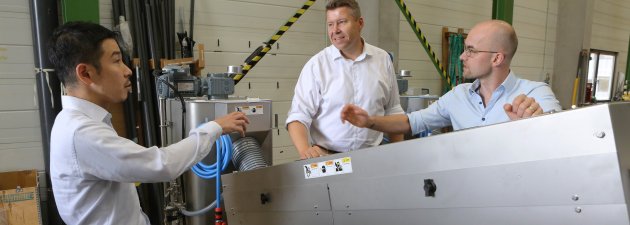Do you know what monozukuri is? It’s Japanese term that roughly translates into Czech as the art of production. It is based on an ancient, sophisticated philosophy and comprises qualities that Czechs also value, namely, the so-called “golden Czech hands” and honest work. AMCON Europe, a subsidiary of the Japanese company AMCON Inc., is an inspiring example of how the monozukuri principles can be applied in the European business environment. The company produces wastewater treatment technologies focused on ecological and economical sludge dewatering for both municipal and industrial wastewater treatment plants.
Japanese innovation not only for the Japanese
The company's management has a clear vision: they focus on increasing their competitiveness and overall growth through expansion in international trade. Their goal is to export and apply Japanese innovation throughout the global market.
AMCON Europe is a living example of this strategy. The company is based near Prague and has been operating here since 2011. Before that, they assembled products in Japan and then exported and delivered them to European customers. A combination of the difficulty in providing quick and local service with undesirable currency exchange rate fluctuations, long delivery times by sea and high shipping costs made the company decide to start local production in Europe. And they went right to the heart of the continent - the Czech Republic.
Sludge is 97 percent water
Wastewater is produced wherever people use water in their activities. Over time, we have learned how to clean it efficiently. However, even after a cleaning process, there is still some remaining waste, that is, sludge.
"If someone says “sludge”, people usually imagine something muddy and thick, but that is not the case at all. At first glance, it looks like very dirty water, with a concentration of suspended solids somewhere between 0.5 and 3%. In other words, such sludge still contains 99.5 to 97% of valuable water," the company’s sales director Miloslav Hloušek explains. "The disposal of such relatively low-concentrated sludge is very expensive. When you dewater it, that is, when you increase the concentration of suspended solids from, say, 1 to 25%, you reduce the sludge volume by 96 percent! Sludge volume reduction means waste volume reduction, that's our market, that's why our work is relevant."
Therefore, AMCON Europe's customers are entities that deal with sludge management. That includes all imaginable industrial fields and, of course, all municipal wastewater treatment plants. Industrial use comprises plastic recycling, the entire food industry, breweries and distilleries. “Our goal is to be a reliable supplier of sludge dewatering technology that excels in low energy consumption, ease of use and efficiency. We are striving for our customers from all across Europe to know that this Czech company with Japanese roots can do the best."
Similar values mean better understanding
AMCON's product and service range has three main pillars: original Volute dewatering presses, professional sludge and wastewater analysis and reliable service. Improper processing of sludge has a very negative environmental impact. It is also costly, making up a substantial part of operating costs in most wastewater treatment plants. AMCON is constantly developing their own innovative technologies, the backbone of which are the Volute dewatering presses (the company describes their launch in 1991 as a revolution in the industry) and the Volute DUO, an evolution launched to the market in 2021.
The patent for Volute was filed in 1991 and officially granted on 27th April 1993. Volute technology is recognized for its unique screw press mechanism that dewaters sludge efficiently, with lower energy consumption compared to other methods.
Volute means "spiral", and the interior of AMCON's HQ building in Yokohama is actually built in a spiral shape. There are many parallels with the architecture of the Czech house designed for the Expo 2025 as well as with its key idea "Creative nation, global reach". This may actually show how close our two nations are in their ways of thinking.
When asked about the practical experience with how a Japanese company works, Miloslav Hloušek replies, "Japanese business culture emphasizes collectivism and teamwork, which is reflected in their longer decision-making processes as people strive to reach consensus. This approach ensures that decisions are well thought-out and have support from the entire team. The flipside is that decision-making sometimes takes longer than you would like. Another important feature is the focus on long-term relationships, which brings greater loyalty and stability. The Japanese hierarchical structure, based on respect for authority, is also different from the Czech approach, which is less strict. There is more micromanagement in Japanese corporate practice, unlike the Czech penchant for improvisation. We try to combine the best of both worlds in our company, with fast- and self-managing creative teams, focussing on long-term relationships with our customers and employees. In any case, both cultures share similar values, such as emphasis on quality work and professionalism. This makes understanding much easier.”
Written by Martina Hošková
Photo credits: Luděk Krušinský


